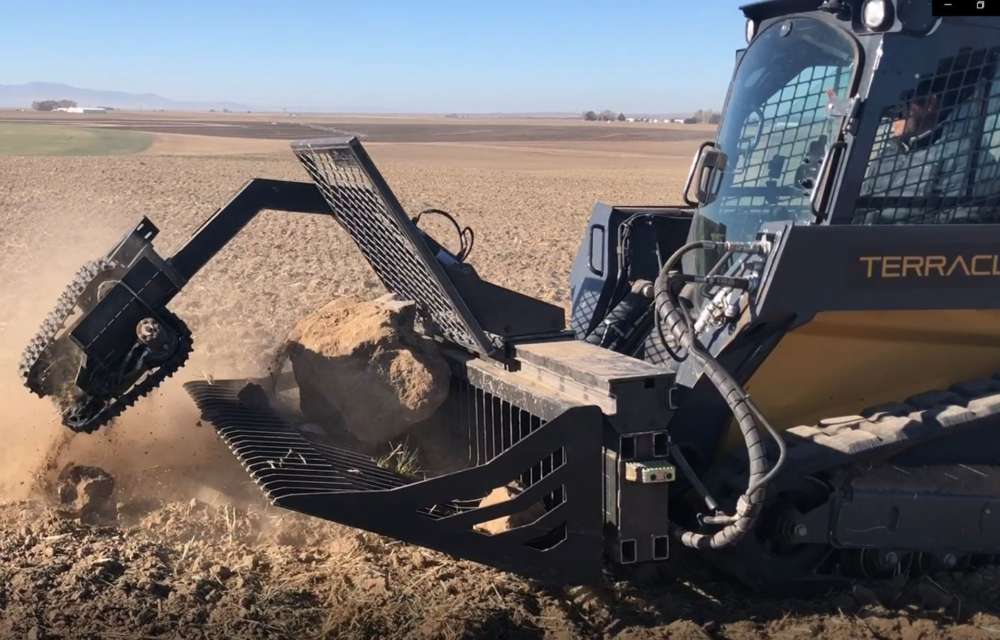Rocks may seem like the least of farmers’ worries. But for some, they can create serious challenges around planting and harvesting. Medium to large farms incur costs of anywhere from $5,000 to $150,000 annually due to problems and damage caused by rocks, according to US startup TerraClear.
“The vast majority of farm ground is between eight to 12 inches deep. Any de-tillage or erosion is going to bring rocks up every year,” CEO Brent Frei tells AFN.
TerraClear recently closed a $25 million Series A round led by existing investor Madrona Venture Group. The raise follows its $6.1 million Series A in 2019 and brings its total funding to $38 million.
The Bellevue, Washington-based startup is hoping to automate the pesky process of removing rocks of all sizes from farmers’ fields. It launched its implement Rock Picker earlier this year – and it has already sold out, according to Frei. A second run of Rock Pickers is slated for later in 2021.
“The uptake was sensational. It was definitely the milestone that we needed,” Frei says. “Because the prognosis was so good with these results we went ahead and did a pretty big round.”
Rock Picker operates on a compact track loader or skid steer and will soon be compatible with front-end loaders on tractors. It takes less than five minutes to mount and works in any field condition, according to TerraClear.
The robotic arm can pick up an average of 400 stones per hour, and can lift rocks as heavy as 300 pounds while preserving soil health by minimizing compaction and ground disturbance.
TerraClear also offers mapping and clearance services for farmers who want a one-stop solution to rock removal. Working with third-party drone services, the startup can map where rocks are located, before deploying Rock Picker to clear the field.
The Series A funding will be used to scale up production, sales, and R&D. TerraClear is also hoping to expand its rock mapping service, which has been focused on the US Northwest so far.
Right now, Rock Pickers are available for one-off purchase – but TerraClear has a subscription-based model on the horizon.
“We’ll have some units that will be used for a service model this Fall. Right now we’re really trying to meet farmers where we can. and it’s easiest right now for them to use the product,” the startup’s president Trevor Thompson tells AFN.
“That allows us to learn a lot about how they are using it and what value it has to offer.”
A back-breaking labor of love
For Frei, picking rocks out of fields brings back childhood memories. The CEO grew up on a farm in Idaho and learned the hard way that some tasks are well-suited for automation.
He’s seen a number of other players that offer rock-removal technologies, but argues that they hew more towards traditional mechanical designs, like rakes, rollers, and sweeps.
“They’re effectively designed for high-density rock removal in granular soil. They’re slow, and it’s tough to cover very much ground with them,” Frei claims.
TerraClear is hoping to differentiate its product through its efficiency and soil-friendly tactics. The addition of AI-driven field mapping also sweetens the deal for farmers.
“There’s nothing [else in the market] that can be used for selective picking, or picking in seeded ground or no-till pasture,” Frei adds.
The startup has a few challenges to contend with as it travels its commercialization journey. The cyclical nature of farming poses some limitations and constraints to performing pilots, offering only narrow windows where field conditions are suitable to collect valuable data on Rock Picker’s performance.
Trying to get investors to understand the addressable market opportunity around rock-picking has also proven difficult at times, Frei says.
“The vast majority of VCs out there have no idea. Not only are they not very up to date on agriculture, but the specifics of problems in agriculture which are more difficult to grasp.”
With its fresh $25 million in the bank, TerraClear must’ve done a top job explaining them.





